|
|
|
Sort Order |
|
|
|
Items / Page
|
|
|
|
|
|
|
| Srl | Item |
| 1 |
ID:
081385
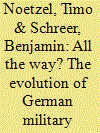

|
|
|
|
|
| Publication |
2008.
|
| Summary/Abstract |
German strategic decision-makers have to reconsider their approach to the use of force. In Afghanistan, the Bundeswehr is faced with the challenge of a growing insurgency. This situation requires a willingness to provide combat forces for the NATO-led International Security Assistance Force. Hence, the conviction in German domestic politics that the Bundeswehr should only be employed for the purposes of stabilization and reconstruction is increasingly challenged by a changing operational reality in Afghanistan, and allies' reluctance to continue to accept German policy. In essence, the issue is about German participation in counterinsurgency operations. To continue current policy undermines Germany's military credibility among allied partners and restrains Germany's ability to utilize fully military power as an instrument of policy. This article argues that while military force in recent years has become an integral part of German foreign policy to pursue national interests, political decision-makers in Berlin and the broader German public will still have to come to terms with the reality of a new security environment in Afghanistan. For the German government the 'small war' in northern Afghanistan is a very politically exhausting undertaking. Both politically and militarily Germany seems ill-prepared to sustain such an operation. Its political and strategic culture still promotes an aversion to involvement in war-fighting. In addition, the government and the Bundeswehr lack vital strategy-making capabilities. Still, there are indicators that the changing operational reality in Afghanistan might lead to a significant evolution of the German approach to the use of force
|
|
|
|
|
|
|
|
|
|
|
|
|
|
|
|
| 2 |
ID:
086945
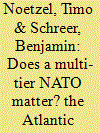

|
|
|
|
|
| Publication |
2009.
|
| Summary/Abstract |
This year NATO will celebrate its 60th anniversary. So far the world's most powerful military alliance has been a remarkable success story. However, as the first decade of the new century draws to a close there appears to be a widening strategic rift among the allies. 'Two-tier NATO' is by now an established piece of shorthand in international strategic debate to indicate an 'alliance à la carte' divided into two or more factions of member states with divergent interests. Evidently, the alliance increasingly struggles to reach consensus on a whole range of strategic issues. So is NATO on a path to disintegration and, ultimately, to failure? This article argues that the organization has developed from a fixed 'two-tier' into a rather fluid 'multi-tier' alliance. On many issues the alliance is in fact divided into several different camps that are pushing in different directions. Thus, allies can be grouped into one of three tiers: a 'reformist', a 'status-quo' and a 'reversal'-oriented one. While the evolution of such a multi-tier alliance will not inevitably result in NATO's demise unmanaged, this manifestation of camps will continuously disrupt the organization's strategic agility. The article finds that if NATO is to maintain strategic vitality, it needs to develop new institutional mechanisms and establish a consensus on its strategic posture in the changing international order and to make 'variable geometry' work.
|
|
|
|
|
|
|
|
|
|
|
|
|
|
|
|
| 3 |
ID:
103299
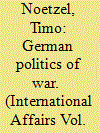

|
|
|
|
|
| Publication |
2011.
|
| Summary/Abstract |
This article analyses the way in which Germany's participation in the international intervention in Afghanistan has shaped and transformed the country's politics of defence and deriving policies. It argues that in the wake of operational challenges posed by the insurgency in northern Afghanistan since 2007, and in particular the increasing rate of German combat fatalities, established post-Cold War dogmas of German politics are becoming subject to erosion. Developments in the Kunduz region of northern Afghanistan, with the tanker bombing of 4 September 2009 as its apex, have had a catalyst function in this process. In particular, strategic, operational and tactical requirements for counterinsurgency operations have had significant politico-strategic repercussions for the country's defence and security policy more generally. As a result, in recent years the Bundeswehr has begun to undergo a far-reaching structural process of military adaptation and innovation. The article explains and analyses this phenomenon of political change and military learning in the context of political paralysis.
|
|
|
|
|
|
|
|
|
|
|
|
|
|
|
|
| 4 |
ID:
091299
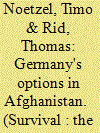

|
|
|
|
|
| Publication |
2009.
|
| Summary/Abstract |
Germany's military mission in Afghanistan has become increasingly politicised in the eight years since it was launched. Political and ideological differences between parties and even between ministries are becoming more pronounced, not less. This trend narrows the room for manoeuvre and limits the strategic debate. Greater instability in Kunduz province, at the heart of Germany's area of regional responsibility in Afghanistan, has two immediate effects: it both increases the need to act decisively and it heightens the risk of political paralysis in Berlin. This article argues that the latter is likely to prevail.
|
|
|
|
|
|
|
|
|
|
|
|
|
|
|
|
| 5 |
ID:
100940
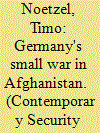

|
|
|
|
|
| Publication |
2010.
|
| Summary/Abstract |
The article analyzes the operational conduct of German forces in northern Afghanistan and the making of German strategy in the context of the International Security Assistance Force (ISAF) since the expansion of the Afghan insurgency to northern Afghanistan in 2007. It is argued that the German contribution to ISAF is characterized by a severe mismatch between politico-strategic planning and decision-making in Berlin on the one hand and operational conduct and requirements on the ground on the other. Since 2007, however, politico-strategic insistence that the German engagement in Afghanistan constitutes a contribution to a post-conflict stabilization and reconstruction effort is steadily eroding. Analysis of German operational conduct in northern Afghanistan makes evident the existing mismatch between strategy and operations, but also reveals that the deterioration of the security situation on the ground has lead to a bottom-up-development of counterinsurgency doctrine, capabilities, institutions, and modus of operandi. Operations have been driving the making of German strategy, not vice-versa, which has severely hampered German efforts to counter insurgents' progress in the north of Afghanistan.
|
|
|
|
|
|
|
|
|
|
|
|
|
|
|
|
| 6 |
ID:
086840
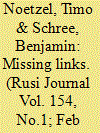

|
|
|
|
|
| Publication |
2009.
|
| Summary/Abstract |
The need for COIN operations to tackle the Taliban insurgency in Afghanistan is accepted by most coalition members. The German army has yet to adapt to this development. This article examines why the German political establishment still contests the need for counter-insurgency tactics in northern Afghanistan.
|
|
|
|
|
|
|
|
|
|
|
|
|
|
|
|
| 7 |
ID:
109961
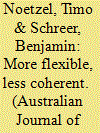

|
|
|
|
|
| Publication |
2012.
|
| Summary/Abstract |
At its 2010 Lisbon summit, the North Atlantic Treaty Organization (NATO) took significant steps towards becoming a modern alliance. In the face of a changing security environment and divergent strategic interests among 28 members, NATO adapted its strategic concept and reformed its way of formulating strategy. The new strategic concept advances conflict management as a core task for the alliance. In combination with a greater emphasis on developing partnerships, NATO conceptually strengthened its profile as a global security actor. The summit also reflected a new approach to formulating NATO strategy by providing the Secretary General Anders Fogh Rasmussen with a strong role in setting the strategic agenda. Indeed, he assumed a more supranational function rather than acting as a representative of all allies. But as the Libya operation demonstrates, NATO will struggle to maintain cohesion in an increasingly 'polycentric' alliance. While the focus on conflict management will make the alliance more flexible, it will also become a less coherent global security actor.
|
|
|
|
|
|
|
|
|
|
|
|
|
|
|
|
| 8 |
ID:
098391
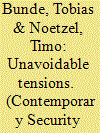

|
|
|
|
|
| Publication |
2010.
|
| Summary/Abstract |
The article puts the contemporary debate on NATO 'going global' into its historical and conceptual perspective. Pressure to expand alliance responsibilities is not new, rather it is a fundamental problem of alliance goal setting and legitimacy. The pedigree of concepts like Global NATO can be traced back to earlier attempts at liberal order-building, efforts that have oscillated between universal and exclusive varieties. Recent proposals for the globalization of NATO or the creation of a global organization of democracies may best be understood as an institutional culmination of the liberal critique of universal multilateralism. While going global, taking on ever greater roles and responsibilities, is inconceivable to many alliance members, the liberal tradition makes expansion of alliance roles increasingly hard to resist. Contrary to prevailing continental European wisdom, the article concludes that the existence of a robust reformist tier within NATO as well as major strategic trends will keep the vision of a Global NATO on the agenda of Western security policy. It argues that exploring NATO's contested global question is crucial for the development and definition of the emerging role of the alliance and collective security.
|
|
|
|
|
|
|
|
|
|
|
|
|
|
|
|
|
|
|
|
|